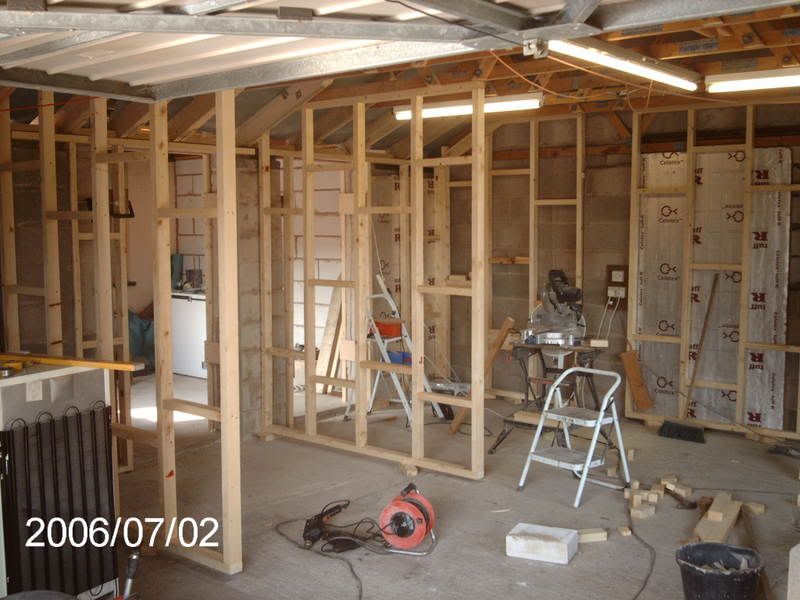
Stud partition walls, any tips?
James - 24/5/07 at 02:57 PM
You've seen where I destroyed the old bathroom wall:
http://www.locostbuilders.co.uk/viewthread.php?tid=67254&contribmessage=none
Need to put summat in it's place (we're not *quite* that liberal!  ).
).
We're desperately short of space for a bath (main reason for moving the wall outwards), so the new wall needs to be as thin as possible.
The old wall used 1 1/4" battons, so I can use the same stuff I guess, except the old one was filled with a 'cardboard' gridwork inside
making it stiffer. But I don't want it any thicker than the old wall or it negates the point of moving the wall!
Plan is to use 9mm plasterboard on the outside which'll be plastered, the inside is to be tiled. It's been sugested I could use ply on the
inside as thin but tileable.
Whatever happens, I've got to be quick as the plasterer is coming on the 9th Jun and I'm busy most of this weekend! 
So, I guess stud work is pretty easy, it's just I've not done it before, and don't really have time to do it twice if I balls it up!

Any tips?
Cheers,
James
jambo - 24/5/07 at 03:04 PM
i would use 1 1/4 by 1" and double them where they meet the joint for the gyproc,ideally you should use moisture board as it is for bathroom
use(useually a green coloured gyproc)also have 2 rows of horizontal dwangs.
907 - 24/5/07 at 03:18 PM
Don't forget the sound insulation in the gap.
Paul G
DaveFJ - 24/5/07 at 03:33 PM
don't forget to make an accurate record of where the studs/nogins are and also and wires/plumbing you might hide inside.....
I asked my builder to do so and he 'forgot' - consequently I spent hours trying to work out where it was safe to drill holes to fix
cupboards and worksurfaces etc 



(see my other rant about british workmanship!)
stevec - 24/5/07 at 03:46 PM
James, If you are going to do lots of jobs round your new house perhaps get one of these or something similar, great for reference.
Steve,
Book
Linky.
millemg - 24/5/07 at 04:06 PM
This is my first attempt at stud walling (after cutting the roof trusses and raising them a foot) 

[Edited on 24/5/07 by millemg]
Peteff - 24/5/07 at 04:29 PM
Fix your ceiling and floor battens then leave the uprights just a couple of mm too long for the gap so they knock in tight. I don't know what
insulation you would put inside as it is thinner than normal studding but I would probably not bother with any in an internal wall anyway. We use 3x2
which gives the same thickness as a single brick wall with the plasterboard on it so standard door frames can be used in it. Buy a decent stud and
cable detector to find nails, cables and pipes if you don't know where they are.
goodguydrew - 24/5/07 at 04:32 PM
I have just done a similar job. B&Q sell various predrilled angle brackets, ideal for this job (if only for reference, as they would be quite easy
to make)
billynomates - 24/5/07 at 06:03 PM
Insulation should be used as it's a bathroom wall your putting in. Wickes do a stud wall insulation that will probably squeeze into a narrower
wall.
As for cables, with a wall this thin you either have to run them in 'safe' zones, (which in a nutshell is vertically or horizontally from
switches and sockets, or 150mm from internal corners of walls), or the cables will have to be run in earthed metal conduit.
Personally, I'd have gone for a 1600mm bath.
JoelP - 24/5/07 at 06:45 PM
1" studs is a bloody thin wall. Make sure you dont fall into it! If i had to make a wall that thin, id be tempted to add a metal frame.
Pezza - 24/5/07 at 07:20 PM
We use steel stud system at work, goes up a damn sight quicker than wood, cheaper too.
Neil2004 - 24/5/07 at 08:08 PM
Follow the link to British Gypsum's website. Click on the pdf for Timber Stud partitioning. This will explain how to install the wall.
http://www.british-gypsum.co.uk/literature/site_book/partition_and_wall_systems.aspx
James - 25/5/07 at 11:02 AM
Thanks for all the useful advice everyone.
Millemg, that's pretty impressive for a first time! 
I'll look into the insulation thing at B&Q today.
Joel,
the current walls are made of 30mm (1 14" ?) stuff. But I guess they're stiffer due to the cardboard(?) gridwork they have inside them.
My girlfriend is a kickboxer aswell, we'll have to remember not to train too close to it! 
Thanks all!
James
James - 25/5/07 at 11:24 AM
quote:
Originally posted by billynomates
Insulation should be used as it's a bathroom wall your putting in. Wickes do a stud wall insulation that will probably squeeze into a narrower
wall.
As for cables, with a wall this thin you either have to run them in 'safe' zones, (which in a nutshell is vertically or horizontally from
switches and sockets, or 150mm from internal corners of walls), or the cables will have to be run in earthed metal conduit.
Personally, I'd have gone for a 1600mm bath.
We thought about the small bath.... but I'm 6'2 and my girlfriend is 5'10"... I'm not sure my legs would fit in, let along my
body aswell! 
Oh, and with the wall where it was, the gap for the bath was only 1560mm anyway! 
I'll bear in mind those points about the electrics!
Cheers,
James
 ).
). 





